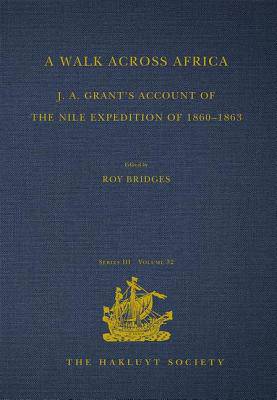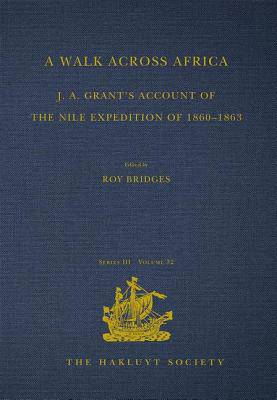
- Retrait gratuit dans votre magasin Club
- 7.000.000 titres dans notre catalogue
- Payer en toute sécurité
- Toujours un magasin près de chez vous
- Retrait gratuit dans votre magasin Club
- 7.000.000 titres dans notre catalogue
- Payer en toute sécurité
- Toujours un magasin près de chez vous
A Walk Across Africa
J. A. Grant's Account of the Nile Expedition of 1860-1863
Description
The Nile Expedition of 1860-1863 was one of the most important exploratory expeditions made in the nineteenth century. The long-debated question of the location of the source of the Nile was answered (despite continuing arguments) and the venture had important historical consequences. Earlier accounts of the expedition have assumed James Augustus Grant to have been no more than the loyal second-in-command to John Hanning Speke, the leader. This new edition of Grant's 1864 book, A Walk across Africa, provides the opportunity to re-examine his role. The original text has been fully annotated with explanatory notes and also supplemented by extracts from the very remarkable detailed day-to-day journal which Grant kept. Even more unusually, this edition includes reproductions of the whole visual record which he made consisting of 147 watercolours and sketches. This was the first ever visual record of large parts of East Africa and the Upper Nile Valley region. These documentary and illustrative materials have been drawn from the extensive collection of Grant's papers now in the care of the National Library of Scotland. The Library has co-operated in the preparation of this volume to make possible its special features.
Grant emerges as a much more impressive and important figure than has previously been recognised. He was a trained scientist and his narrative is a well-organised perspective on the expedition and its activities. His own growing understanding of Africa and of Africans becomes apparent and helps to explain his later activities.
The editor provides a context to the expedition and its results and this includes a new approach to the understanding of the Nile source problem by exposing the credulity of the way many previous commentators have used Ptolemy's information and also by suggesting that the problem should be approached in the light of geological and geomorphological as well as historical information. The Introduction in addition discusses Grant's work in the light of the development of the academic understanding of the history of Africa and of European involvement in the region.
Spécifications
Parties prenantes
- Editeur:
Contenu
- Nombre de pages :
- 446
- Langue:
- Anglais
- Collection :
Caractéristiques
- EAN:
- 9781908145161
- Date de parution :
- 19-03-18
- Format:
- Livre relié
- Format numérique:
- Genaaid
- Dimensions :
- 180 mm x 249 mm
- Poids :
- 1224 g






